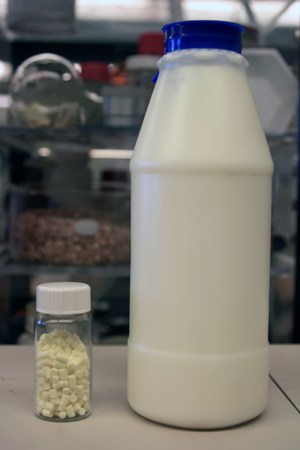A research team led by Allen Apblett from the Oklahoma State University in Stillwater has delivered a presentation on the development of a capsule containing metal-oxide nanoparticles at the American Chemical Society’s 243rd National Meeting & Exposition.
 Scientists have developed a capsule that removes radioactive decontamination from milk and other beverages. (Credit: Allen Apblett)
Scientists have developed a capsule that removes radioactive decontamination from milk and other beverages. (Credit: Allen Apblett)
This capsule is capable of extracting a dozen radioactive materials from fruit juices, milk and water. According to the researchers, this technology shows promise for large-scale utilization in the food processing industry or could be used as a tiny capsule that consumers can add to beverage containers to remove the radioactive contaminants, thus allowing safer consumption.
Apblett informed that the researchers repurposed and repackaged the technology that was originally developed for extracting uranium and other heavy metals from oceans and heavily contaminated water. Increasing threat on the use of nuclear materials by terrorists and disaster at the nuclear plant in Fukushima, Japan prompted the researchers to shift their focus towards this technology, which can also extract heavy metals such as cadmium, lead and arsenic from beverages.
The core of the technology is the metal-oxide nanoparticles, which extract radioactive substances and other unwanted materials from a solution by reacting with them. These nanoparticles are capable of absorbing all 15 ‘actinide’ chemical elements, non-actinide radioactive metals, and other non-radioactive elements. These particles are then filled inside a capsule that resembles a medicine capsule. This capsule is then dropped into beverage containers and stirred, causing the contaminants to get extracted and accumulated inside the capsule. The removal of the capsule produces a beverage, which is safe for drinking.
The novel technology will soon be used in commercial applications, and the first application will be the purification of calcium dietary supplements to extract any traces of radiostrontium, cadmium and lead.